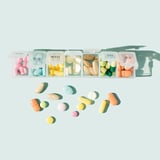The following article contains spoilers for the “Tell Me Lies” season 2 series finale.
If you’re captivated by the hit series “Tell Me Lies” along with the rest of the world, you’re likely well-versed in the complicated (and very steamy) love between Lucy Albright and Stephen DeMarco. But along with the intoxicating drama, a recent episode depicts one of the characters dying after he split a time-release pill in half while also drinking alcohol. The death itself was shocking, but the cause explained in the show also led many viewers to ask: is splitting time-release pills really that dangerous?
The TL;DR is yes, splitting time-release pills is a serious, potentially fatal no-no. Here, two MDs explain exactly why splitting this type of pill is so risky.
Experts Featured in This Article:
Christopher Hollingsworth, MD, is a board-certified general surgeon.
Laura Purdy, MD, is a family medicine physician and founder of telehealth company Swell Medical.
What Are Time-Release Capsules?
“A time-release pill is a type of pill that is designed with a mechanism to slow the release and absorption of a drug,” says board-certified general surgeon Christopher Hollingsworth, MD. So rather than the ingredients in the pill releasing all at once, a time-release pill is intended to maintain a consistent level of medication in the body over an extended period of time, he tells PS. “Time-release pills are used to release a drug that works best when it’s stable in the bloodstream, because drugs are often absorbed quickly without this technology, and if drugs are absorbed too quickly, the amount in a patient’s bloodstream can rapidly peak and then just as rapidly crash afterwards.”
Not all medications have this effect, but the rapid peak and crash can be particularly common in drugs that have a short half-life, which is the amount of time it takes for the drug’s initial concentration in the body to decrease by half, Dr. Hollingsworth says. “There are different types of time-release technologies that involve special coatings, microparticles, gels, and membranes, and all of these different products are designed to be handled with care and not to be tampered with prior to administration,” he says. “Any alteration of the product has the potential to dangerously change the way the drug is absorbed.”
Is It Dangerous to Split a Time-Release Capsule?
Yes, it can be extremely dangerous to split a time-release pill due to unpredictable fluctuations of drug levels in the body, says Laura Purdy, MD, a family medicine physician and founder of telehealth company Swell Medical. “The coating or formulation of the pill may have been specifically designed to control the release of the medication, and splitting it can alter this process,” she explains. As a result, the active ingredients of the pill may not be evenly distributed, causing too much or too little of the medication to be released in the body.
Dr. Hollingsworth agrees, noting that tampering with a time-release pill can be extremely problematic. “The time-release technology is often related to the protective, slowly absorbed coating, and exposing the unprotected drug in the core of the pill bypasses the time-release coating, allowing the drug to be rapidly released and absorbed,” he explains. “This then allows the drug to reach higher levels in the bloodstream than it was designed for, causing someone to get way too much of the medication.”
Is Half a Tablet Half a Dose?
Some people may think that only taking half of a time-release capsule isn’t as risky, since you’re taking a lower dose of the medicine, even if it’s hitting your bloodstream all at once. But that’s not the case. “If a time-release tablet is split perfectly into equal halves, then half the tablet contains half the amount of the drug, but with the time-release technology potentially inactivated,” Dr. Hollingsworth says. The damage to the time-release coating also exposes the drug-containing core of the pill, allowing the drug to be absorbed quicker, which can be dangerous, he says.
Remember: the formulations of time-released pills are designed to release the medication in a specific way and splitting them can alter their effectiveness and cause serious harm, Dr. Purdy says. When medication is prescribed to you, it’s prescribed that way for a reason, so it’s best to take as directed by your doctor to ensure its safety and effectiveness.
Is It Dangerous to Mix Alcohol With Time-Release Pills?
As a general rule of thumb, you should never mix alcohol with any type of pill, unless you’re specifically told you can by the prescribing doctor. Why? “Alcohol can interact with the medication and either inhibit or intensify its effects, which can lead to adverse reactions, overdose, or other serious health risks,” says Dr. Purdy.
In terms of time-release pills specifically, alcohol can alter the absorption of the drug by interfering with the time-release delivery system, Dr. Hollingsworth says. Sometimes, alcohol can even change the absorption of the drug itself, he adds.
List of Medications That Cannot Be Split
Any kind of time-release pill, tablet, or capsule cannot be split, says Dr. Hollingsworth. Repeat: it’s dangerous to split any and all time-release pills, tablets, or capsules!
If a medication is intended to be split, it will often show a split line down the center, but you should not be splitting any of your own pills, unless specifically instructed by a doctor, Dr. Purdy says. Stimulants, sedatives, and pain mediations are particularly dangerous when altered, and should only be used as directed by a doctor, Dr. Hollingsworth adds.
Time-release pills are safe when taken as prescribed, but if you have questions or concerns about a medication, always always always talk to your doctor, stresses Dr. Purdy. Never take medical matters into your own hands.
Andi Breitowich is a Chicago-based freelance writer and graduate from Emory University and Northwestern University’s Medill School of Journalism. Her work has appeared in PS, Women’s Health, Cosmopolitan, and elsewhere.




